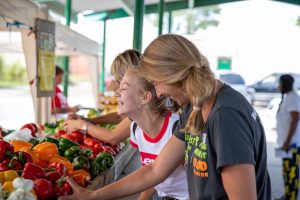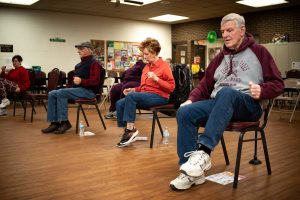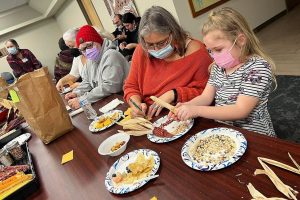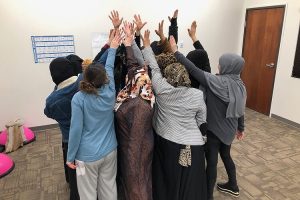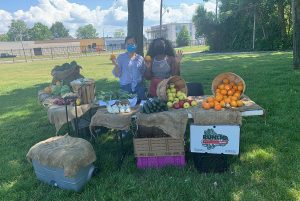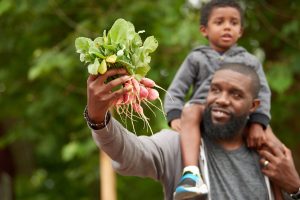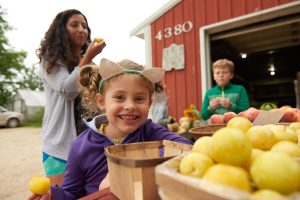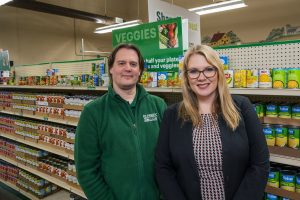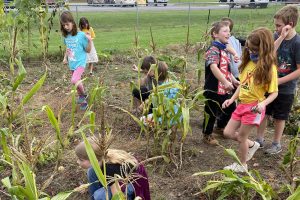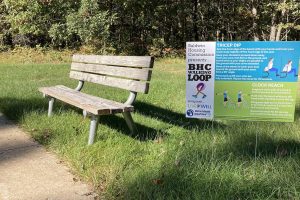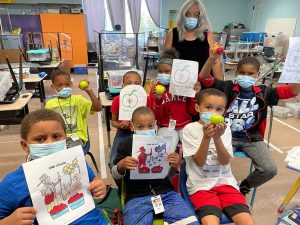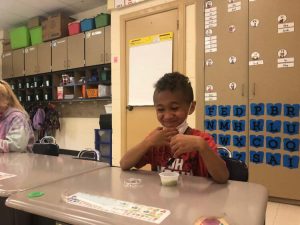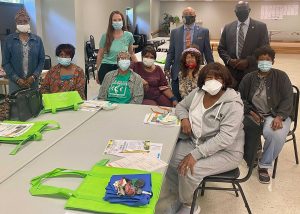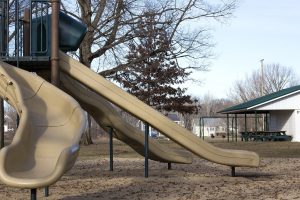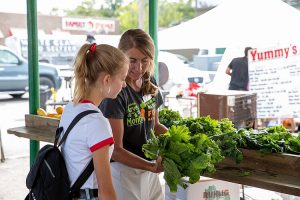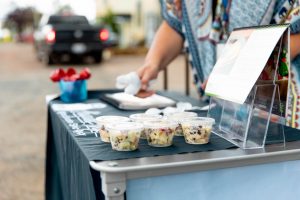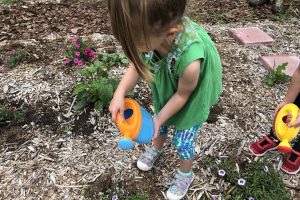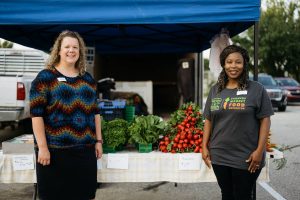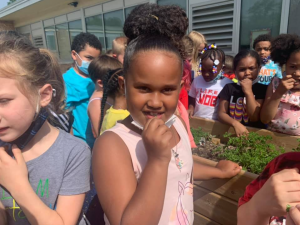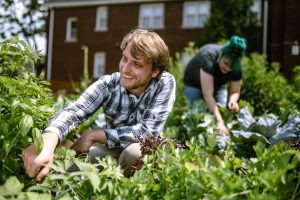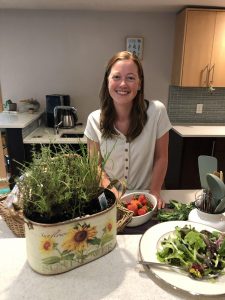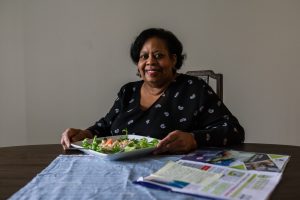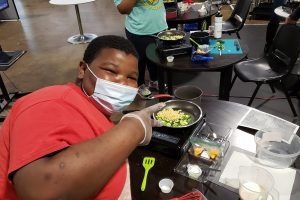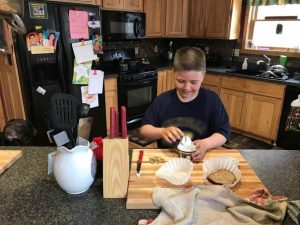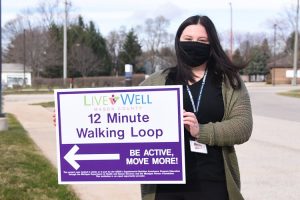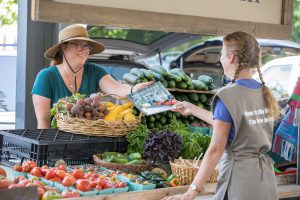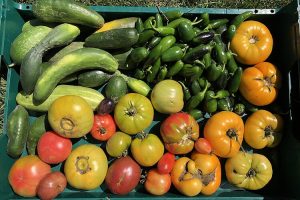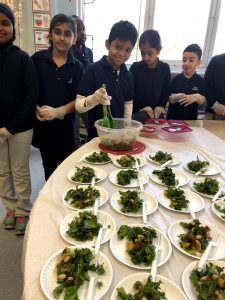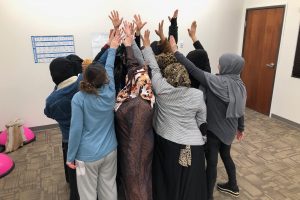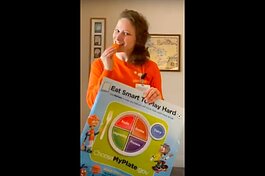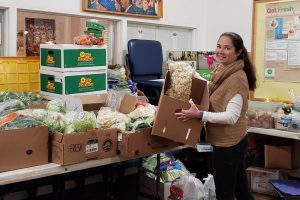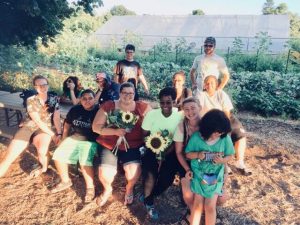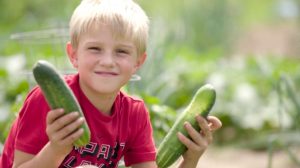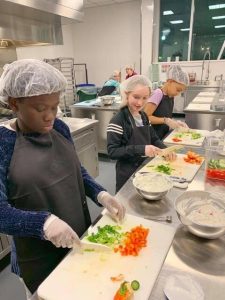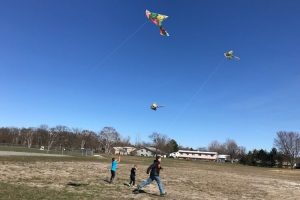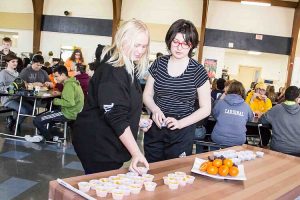Want to get all the latest news delivered right to your inbox?
The articles below are from Michigan Fitness Foundation’s Stories of Change, a series of inspirational stories about the people who deliver evidence-based programs and strategies that empower communities to eat healthy and move more.
Michigan Fitness Foundation connects families to farmers and fresh, locally grown food
MFF’s innovative Michigan Farm to Family: CSA (MF2FCSA) program addresses the gap between local farmers and consumers by partnering with local farms and community organizations to provide affordable access to nutritious, locally grown produce to residents in their communities.
Read More
Rec-Connect™ makes fitness fun for everyone
Across the state, Michigan Fitness Foundation’s (MFF) Rec-Connect™ demonstration series is being used in communities to inspire and empower people to engage regularly in physical activity. Rec-Connect™ offers accessible activities for participants of all ages so they can make physical activity part of their regular routine.
Read More
NorthWest Initiative collaborates with community to create a healthier Lansing
Through their work with the Sugar Smart Coalition (SSC), they reach out to local restaurant owners, managers, and staff to see if there is interest in collaborating on ways to reduce sugary drink consumption for children by changing the children’s menu offerings.
Read More
Active communities are healthier communities
Active communities make it easy for people to include physical activity in their daily lives. From small rural townships to large urban centers and everything in between, communities have different needs and face different challenges when it comes to developing infrastructure that makes it easy for residents to be active.
Read More
Gardens growing change in Flint
With a focus on senior center-based community gardens, GFHC is working with the community to address obstacles to healthy living by improving access to fresh fruits and vegetables and providing a safe place for senior citizens to be active in the region.
Read More
Detroit Public Schools Community District Farm-to-School initiatives grow through SNAP-Ed
Detroit Public Schools Community District (DPSCD or District) emphasizes a holistic approach to education and their Farm-to-School initiative is one of the ways the District helps ensure its students are not just academically successful, but also physically healthy.
Read More
Bay Mills Community College SNAP-Ed programs inspire healthy living
Bay Mills Community College (BMCC) is working with the Bay Mills Indian Community to leverage Supplemental Nutrition Assistance Program Education (SNAP-Ed) programming to create environments that inspire healthy living
Read More
Dearborn nonprofit forges relationships to inspire healthy living
Dearborn-based Leaders Advancing and Helping Communities (LAHC) has honed the art of bringing community residents and organizations together while ensuring that the unique perspectives of Arab Americans, refugees, and immigrants have a seat at the table during the decision-making processes.
Read More
Henry Ford Health SNAP-Ed collaborations creating healthy change
From creating free farm stands in Detroit to promoting healthier drinking water in the Jackson area, the Henry Ford Health initiative Generation with Promise (GWP) is supporting healthier families and communities across Michigan.
Creating sustainable, local food systems through food policy councils
Local food policy councils are built on partnerships. To understand, assess, and create food systems that work for everyone, food policy councils bring together the voices of residents, local businesses, government agencies, nonprofits, education organizations, and those who deliver Supplemental Nutrition Assistance Program Education (SNAP-Ed) in their communities.
SNAP-Ed programs grow change in Michigan’s northwestern rural communities
At MFF, our SNAP-Ed work inspires people to eat healthy and move more,” shares Whitacre. “On the nutrition side, our SNAP-Ed partners work with people in their communities in areas like how to access healthy foods in their neighborhoods, how to navigate the local food pantry, and where they can find recipes for healthy foods that may be new to them.
SNAP-Ed programs grow change in Michigan’s northwestern rural communities
Nearly 1.3 million Michiganders lack nutrition security – meaning they lack consistent access to the nutrient-rich fruits and vegetables needed to sustain good health. Gleaners Community Food Bank of Southeastern Michigan (Gleaners) is working to bolster nutrition security by actively sourcing a variety of fruits and vegetables that they deliver to area food pantries and other charitable food programs, and by providing nutrition education information for pantry guests.
SNAP-Ed programs grow change in Michigan’s northwestern rural communities
At Creekside School in Traverse City, students are bused in from five area counties. Formerly known as the New Campus School, this K-12 center provides a safe and structured learning environment that combines academics, behavioral instruction, community-based education, and counseling for students with emotional impairments or severe behavioral concerns.
District Health Department #10 builds healthier communities in 10 Michigan counties
Spanning 10 counties, District Health Department #10 (DHD#10) is the largest health department in Michigan by geographical service area and the 10th largest by population served. While the area encompasses regions known for farms, orchards, forests, rivers, and a variety of recreational assets, residents still experience food insecurity and difficulty accessing places to be physically active.
Rec-Connect™ empowers Detroit high school student leaders to foster physical activity among peers
Wayne State University’s (WSU) Detroit Healthy Youth Initiative has been working in the Detroit Public Schools Community District for over a decade, providing nutrition education and facilitating student-led policy, systems, and environmental (PSE) change work to increase healthy eating and healthy food access across Detroit.
Traverse City Area Public Schools becoming a healthier place to learn
Like other tourism-based communities across Northern Michigan, the Traverse City region is known for its bountiful farms, orchards, trails, and recreational opportunities; assets not typically associated with food insecurity or a lack of opportunities for physical activity. Yet many residents struggle with hunger and access to places where they can be active.
Genesee County organizations collaborate to create healthy local places
Genesee Intermediate School District (GISD) and Crim Fitness Foundation (Crim) deliver a variety of direct education programs that encourage youth and adults across Genesee County to eat healthy and move more. Both organizations also advance policy, systems, and environmental (PSE) change strategies that address obstacles to make healthy choices more accessible to county residents.
Battle Creek Family YMCA changes palates one vegetable at a time
When Battle Creek Family YMCA staff looked at the challenges facing their community, the lack of access to fresh fruits and vegetables topped the list. Many families the organization serves noted there were few grocery stores offering fresh produce nearby. And with tight food budgets, they also expressed caution about spending their limited dollars on fresh foods they weren’t familiar with preparing — especially produce that could spoil more quickly than shelf-stable items.
Thumb-area collaboration blesses bus riders with food and more
Located in Michigan’s Thumb region east of Bay City, Tuscola County has long had its share of food insecurity, and the pandemic only made that situation worse. For over a decade, Tuscola Intermediate School District (TISD) has worked with Michigan Fitness Foundation (MFF) to respond to needs in the community by delivering nutrition education and physical activity promotion through Supplemental Nutrition Assistance Program Education (SNAP-Ed) programs in TISD’s schools and communities.
Greater Flint Health Coalition + SNAP-Ed = a healthier community
The Greater Flint Health Coalition (GFHC) is focused on improving the health of Genesee County residents. To do this, they offer a variety of programs to engage residents in fun, easy ways that support healthy behaviors and connect people of all ages to resources that help them live healthier lives. So it just made sense for the coalition to add two new programs that support residents in eating healthy and moving more.
SNAP-Ed Eastern U.P. LifeSPAN team is helping to get the U.P. active
When COVID-19 shutdowns began impacting the Eastern Upper Peninsula Intermediate School District (EUPISD), the Life Sustaining Physical Activity and Nutrition (LifeSPAN) team found the proverbial silver lining and leveraged it to create opportunities that will benefit their community long after the pandemic has passed.
Gratiot-Isabella Regional Education Service District promotes active, healthy communities
As one of MFF’s longstanding SNAP-Ed grantees, Gratiot-Isabella Regional Education Service District (GIRESD) has been supporting health in Mid-Michigan for years by providing nutrition education and physical activity promotion in their service area. With direct education laying the groundwork, GIRESD has expanded their work to include community-based PSE strategies that help improve food access and create safe places for physical activity.
Food Navigators deliver healthy food to the people
As a Farmers Market Food Navigator (FMFN), St. Germain works Thursdays at the Muskegon Farmers Market, but she knows not everyone can get to the market when she is there. So, on the first three Mondays of the month, you’ll find her cruising Muskegon Heights in the YMCA Veggie Van, a mobile farm stand. Neighbors can catch up with her at Scott Meats, where they can shop for fresh fruits and vegetables, pay for them using their SNAP benefits, and learn about how to use the produce they purchase, right outside the family-owned butcher shop.
In the Upper Peninsula, finding an affordable CSA is a SNAP
“In the last couple of years, I was really having to cut back on buying fresh produce, even though it was something I wanted to have in my diet,” [Donna*] says. “I had friends who were participating in farm CSAs and it was a wonderful thing for them. They shared with me sometimes, but I thought, ‘I’m never going to be able to afford something like that. A CSA is too out of reach for me.'”
Last spring, the moment Donna saw a post on social media about Michigan Fitness Foundation’s (MFF) Michigan Farm to Family: CSA (MF2FCSA) program for people eligible for Supplemental Nutrition Assistance Program (SNAP) benefits, she called right away to reserve her spot.
Child and Family Charities teaches healthy life skills with SNAP-Ed programs
Since 1911, Child and Family Charities (CFC) has been protecting and strengthening families in need. Their primary mission is to support children, families, and individuals in a changing community. One way they do this is by teaching families about the foundations for healthy living by using a variety of Supplemental Nutrition Assistance Program Education (SNAP-Ed) programs designed to educate and inspire.
Henry Ford Health System Food Navigators build better nutrition in Wayne and Macomb counties
Like their counterparts across the state, Henry Ford Health System (HFHS) Farmers Market Food Navigators help shoppers get the most out of their food dollars when purchasing fresh, healthy foods for their families at their local farmers markets.
Food Navigators give personalized tours, introduce shoppers to the farmers that grow their food, and provide information on food assistance programs available at the market.
Calhoun ISD: Schools grow gardens and healthy habits with students and communities
CISD serves schools in Barry, Branch, Calhoun, Kalamazoo, and St. Joseph counties. They have two main goals for their SPLASH programming. The first is focused on policy, systems, and environmental change (PSE) work, where school families and community residents have increased access to affordable, delicious, healthy foods and safe places to be physically active.
SNAP-Ed plays a part in creating community health hubs in schools
A vibrant collaboration between the Health Department of Northwest Michigan (HDNW) and the rural school districts in Antrim, Charlevoix, Emmet, and Otsego counties has helped transform school buildings into community hubs where residents learn to live healthier lives. Delivering Supplemental Nutrition Assistance Program Education (SNAP-Ed) programming, HDNW has inspired teachers, their students, and families to find ways to eat better and become more physically active.
SNAP-Ed program connects southeast Michigan’s Indigenous peoples with traditional, local food
But a new food sovereignty program led by Detroit-based nonprofit American Indian Health and Family Services (AIHFS) is engaging youth leaders to develop solutions by building relationships with local Indigenous farmers growing traditional native fruits and vegetables to supply foods for future AIHFS programming.
Innovative program makes CSAs accessible to Michigan families
A community supported agriculture (CSA) share is a great way to get a weekly dose of fresh, healthy produce from your local farm, but the traditional “pay-up-front” cost is prohibitive for many families on a tight budget. Michigan Fitness Foundation (MFF) is working to change that through a program called Michigan Farm to Family: CSA (MF2FCSA), which offers families fresh fruits and vegetables through local CSA shares at a reduced price, and without having to pay the full CSA share cost up front.
Fresh Conversations inspires Detroit seniors to eat healthy and move more
Like many of Detroit’s older adults, LaDonna Johnson lives in an assisted living community and chooses most of her meals from the facility’s menu. Since she started taking part in Fresh Conversations, a weekly nutrition class offered to seniors by the Methodist Children’s Home Society (MCHS), she’s become more mindful about making healthy food choices.
Cooking classes help Detroit youth knock out bad eating habits
Youth at Detroit’s Downtown Boxing Gym are learning to do more than just put up their dukes. Through a program called The Learning Kitchen, offered by GenesisHOPE Community Development Corporation, the gym’s third through eighth graders are top contenders when it comes to eating more fruits and vegetables.
Michigan Harvest of the Month™ instills healthy habits in class, at home, and for life
For many parents, encouraging children to eat more fruits and vegetables can be an exhausting battle. This is not the case for Matt Perkins, a fifth-grader at Rudyard Elementary School in Michigan’s Eastern Upper Peninsula. His mother, Karen Perkins, says Matt often encourages his parents to eat more vegetables and loves going to the grocery store and cooking dinner for the family.
New project encourages Baldwin and Ludington residents to get active in their own neighborhoods
New wayfinding signs in two northwestern lower Michigan communities are encouraging public housing residents to get out and walk routes in their neighborhoods, as part of a greater effort to promote physical activity and healthier lifestyles. In September, temporary lawn signs marking the designated routes were placed outside Lawndale Apartments in Ludington and the Baldwin Housing Commission in Baldwin.
“I’ve been where they are”: Van Buren County nutrition educator journeys from student to teacher
While Manriquez was still in eighth grade, one of her teachers pushed her to apply for a scholarship available for children of migrant workers. Winning a full scholarship allowed her to eventually study criminal justice and social work at Western Michigan University, making her the first person in her family to attend college.
Farmers Market Food Navigators help maximize Prescriptions for Health
Gratiot-Isabella Regional Education Service District (GIRESD) issued Prescriptions for Health (RxFH) to approximately 100 low-income participants over the past three years, but they don’t fill their prescriptions at the drugstore. They use their prescriptions as coupons for fresh fruits and vegetables at Mt. Pleasant’s Island Park Farmers Market and St. Louis Farmers Market, where friendly Farmers Market Food Navigators share nutrition tips and teach them how to make the most of their food dollars.
Bountiful community garden helps reduce food insecurity in Northwest Michigan
Thousands of people are aided by food pantries in Northwest Michigan where families live with food insecurity. While food pantries address food emergencies in the immediate sense, they aren’t a long-term solution to a long-standing problem. It takes a larger policy, systems and environmental change (PSE) approach.
Healthy Habits Start Now through collaboration between Livingston and Washtenaw counties
For the last four years Amy Baxter, lead teacher for the Summer Success Academy (SSA) program at Lincoln Consolidated Schools in Augusta Township, has heard the same refrain from students as summer approaches.
Nonprofit LAHC breaks obstacles to physical activity for Dearborn residents
The nonprofit Leaders Advancing and Helping Communities (LAHC) has spent decades providing a variety of services for Dearborn residents, most recently using Supplemental Nutrition Assistance Program Education (SNAP-Ed) funding to make physical activity more accessible to all.
Michigan SNAP-Ed YouTube channel delivers Online Learning in a SNAP
When COVID-19 hit Michigan in March, Michigan Fitness Foundation (MFF) and its many community partners had to figure out how to continue reaching Michigan families with vital information about healthy eating and physical activity. By mid-April, MFF had launched a solution: Online Learning in a SNAP, a YouTube-based learning platform that enlists statewide partners to produce short videos that inspire healthier living.
It takes a village to improve the health and wellbeing of families in Northwestern Michigan
When a transplanted Arizona bike enthusiast met a Michigan SNAP-Ed nutrition educator who had young children learning to cycle, the result was a highly successful collaboration that now includes walking and biking programs at all Traverse City elementary schools.
Nutrition education partnerships benefit Muskegon-area residents
Across Michigan, organizations are partnering to teach interactive nutrition education programs to low-income Michiganders so they can make healthy food choices within a limited budget and choose physically active lifestyles.
CrimFit Nutrition Program brings exercise and nutrition education to thousands of Flint kids at home
As the COVID-19 pandemic continues and Flint kids begin online-only schooling, opportunities for physical exercise and nutrition education will be scarce. But a team of Crim Fitness Foundation (Crim) staffers is working to address that by bringing the Crim’s Nutrition Program (CrimFit) out of the classroom and into families’ homes.
Physical literacy is a movement that’s catching fire
According to Moreno, researchers have determined that teaching children to be competent movers at a young age can have a lifelong impact. He explains that it gives them the confidence to learn other physical activities as they age.
Fresh Conversations program helps Detroit seniors change dietary and fitness habits for the better
Before she joined Fresh Conversations, a weekly health and fitness class, Fannie Johnson, 77, was overweight and battling high blood pressure and high cholesterol. Soda pop and other high-sugar foods were part of her daily diet.
Saginaw Farmers Market Food Navigator leads families to healthier lifestyles
When Jaime Huffman gives her children money to spend at the Downtown Saginaw Farmers Market, they skip right past the cookies and kettle corn, instead returning with microgreens, cherries, and cucumbers. Huffman says that’s thanks to the friendly presence of Farmers Market Food Navigator Josh Miller, who helps market patrons build healthy eating habits, make the most of SNAP benefits, and build relationships with their farmers.
National Kidney Foundation of Michigan introduces nutrition and fitness to classrooms
….Physical Education and Nutrition Education Working Together, or “PE-Nut.” The program uses a whole-school approach to motivate students, parents, and educators to eat healthier and be physically active. Bolstered by her classmates’ courage, Norah tried a sample of a bell pepper dip that the educator offered. Bell peppers went from the realm of loathed to loved, and now Norah regularly asks to snack on them.
Program aims to get adult foster care home residents in Copper Country moving more and eating better
Many of the residents with cognitive impairments at adult foster care homes served by Copper Country Community Mental Health Services were surprised to learn that burritos don’t have to contain meat, but can instead be filled with black beans and vegetables.
How edible schoolyards in Lansing help feed the community
When 6-year-old Dylan Sisco came home from Lansing’s Riddle Elementary School gushing about an afterschool garden club, her mother, Wendy Sisco, took notice.
Nutrition in Action serves kids and adults an extra helping of health
When YMCA of Greater Grand Rapids Nutrition in Action Director Jennifer Lambert shared a red pepper and hummus tasting with a group of school kids, the children turned their noses up. They all thought red peppers were extremely spicy and they’d never seen hummus before. But after Lambert encouraged them to try just one bite, the kids couldn’t wait for red peppers to be on the school lunch menu again.
How policy, systems, and environmental change can create healthier Michigan communities
Fifteen years ago, Traverse City’s health outcomes were relatively poor, especially among its low-income neighborhoods. That’s when residents and community organizations leveraged federally-funded Supplemental Nutrition Assistance Program Education (SNAP-Ed) programming to create positive change that still reverberates today.
Easy-to-access website helps Michigan families Eat Well in a SNAP
Michigan Fitness Foundation’s (MFF) Eat Well in a SNAP website originally launched in December 2018 to help SNAP-eligible Michigan residents manage their food budgets during the government shutdown. But when the government reopened, Mary McGuire, MFF communications manager, aptly asked, “Now what do we do?”
Kitchen classroom empowers young chefs to pursue healthful choices
What happens when a group of teens taste recipes they prepared themselves from whole grains, fresh vegetables, and homemade vinaigrette? They want to have more than one taste.
Rec-Connect program encourages culturally appropriate recreation in Bay Mills Indian Community
As coordinator for the Bay Mills Indian Community’s Rec-Connect program, Amber Stephan says her job is to provide new physical activities for community members to try as a way to add more physical activity to their daily lives in addition to eating healthy.
Linking Lessons brings healthy lifestyle basics to Metro Detroit teens
“The goal of Linking Lessons is to provide a basic introduction and education on the importance of nutrition and physical activity,” explains Nahan, community coordinator with Henry Ford Health System (HFHS) Generation With Promise, a team that focuses on community health, access, wellness and opportunity.
MARESA promotes healthy eating and fitness in the rural Upper Peninsula
The remoteness of communities in Michigan’s central Upper Peninsula creates obstacles to healthy food choices and physical activity for many families. Some families live an hour away from the closest grocery store and often pay higher prices for limited, healthier options. Families often live far apart, making after-school playdates difficult. Many children don’t have bicycles.
For Calhoun ISD, community change starts with healthy classroom food tastings
When leaders of the Calhoun Intermediate School District’s (CISD) SPLASH/Nutrition program run into parents of the kids they work with, they often hear the question: “You’re the person who got my kid to try a new vegetable. How did you get them to do that?”
Coalition aims to build a healthier community in UP’s Kinross Township
Trying to promote physical activity in Kinross Charter Township is a path littered with hurdles. The rural community about 20 miles south of Sault Ste. Marie has just one recreation center, which is not open on weekends. The community of about 6,000 lacks sidewalks, and it’s not safe to walk along snow-covered streets in the winter. Snowshoe and cross-country ski trails exist in the region, but they’re not in proximity to residential areas. Transportation can be a problem.
Working together to improve food security in Warren
Food insecurity, in general, refers to a lack of resources as well as access to enough food to live an active, healthy life. 68% of students in Warren Consolidated Schools (WCS) qualify for free and reduced school lunch programs. What’s more, families miss out on an average of 3.5 meals per person per week.
Project LEAN encourages kids to eat healthy through hands-on fun
The strawberry has been the undisputed champ at Ring Lardner Middle School in Berrien County for the past two years. Mirroring the annual March Madness in basketball, the school has staged a fruit-and-veggie challenge by serving fresh fruit and vegetable samples every day from local area farmers, with students voting for their favorites. “It’s a lot of fun,” says Evan Winkler, Ring Lardner’s assistant principal. “Kids are eating things I never thought they would eat.”

